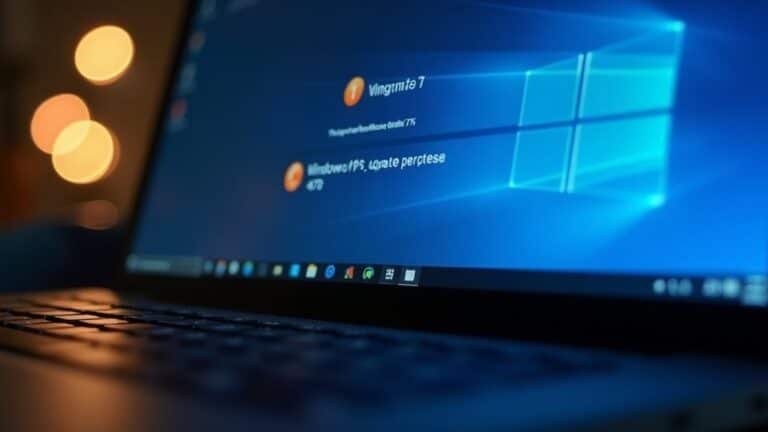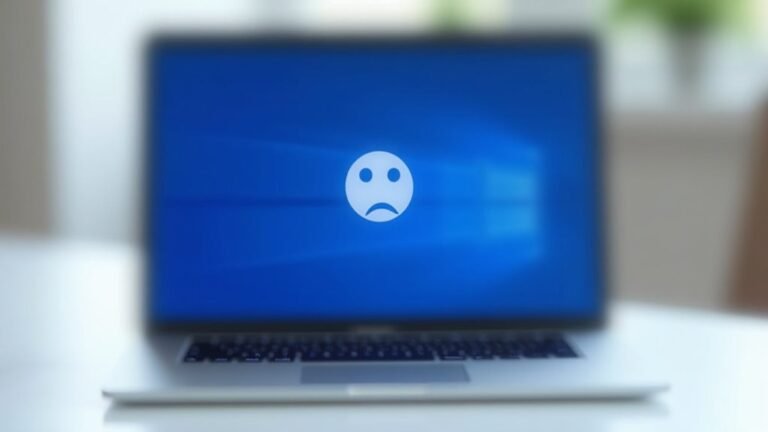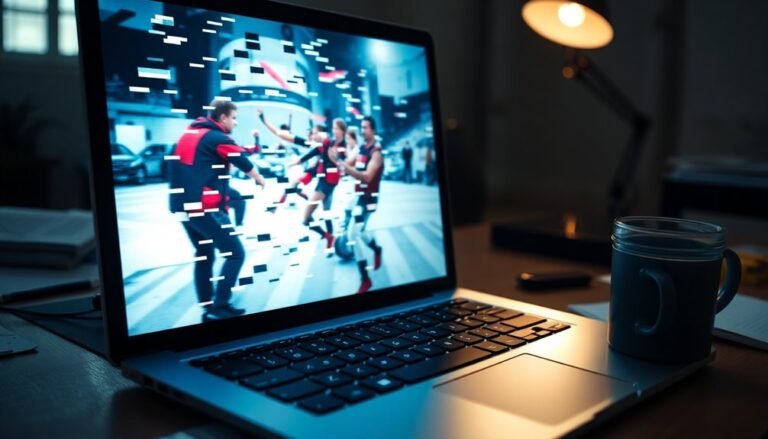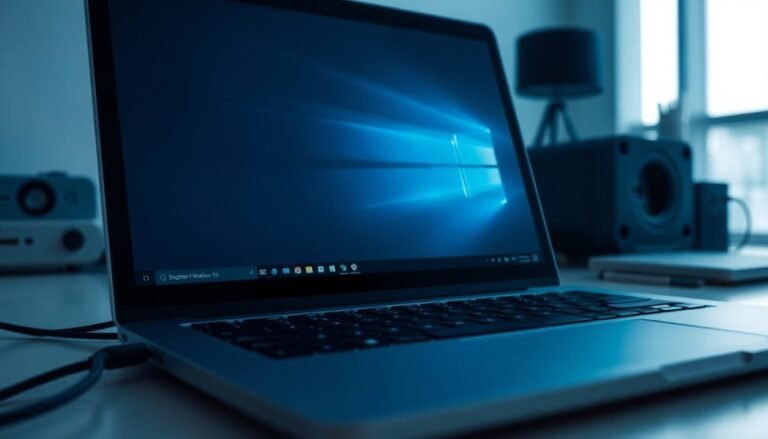Windows Media Player Legacy Not Responding: Fix Media Player Crashes
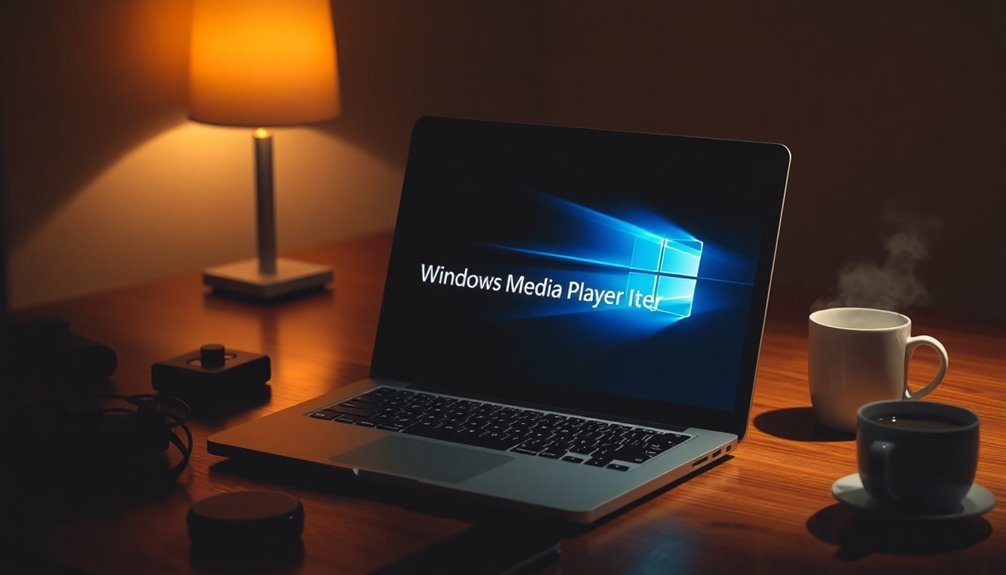
If Windows Media Player Legacy isn’t responding, it may be due to corrupted files, codec issues, or software conflicts. Start troubleshooting by using the built-in troubleshooter or resetting the application through Settings.
Make sure your codecs are updated, and consider clearing the media library cache. If problems persist, you may need to reinstall the player or switch to an alternative.
There are several effective solutions available for common issues, so keep exploring for more fixes.
Common Causes of Media Player Not Responding

When facing issues with a media player that’s unresponsive, there are several common causes to consider. One major factor is corrupted or outdated library files, particularly those with the .wmdb extension, which can lead to crashes and performance issues. To resolve this, deleting the corrupted files allows the media player to recreate a new library, effectively restoring its functionality. Make sure to stop the “Windows Media Player Network Sharing Service” before deletion to prevent any conflicts. Another prevalent issue is codec and file format compatibility. If the media player supports unsupported formats or is missing essential codecs, it may freeze or fail to play media files. It’s important to check for and update any missing codecs to ensure smooth playback and stable performance. Conflicts with other software, especially media-related applications, can significantly hinder media player operation. Disabling problematic third-party plugins can often help to resolve these conflicts and improve responsiveness. Finally, having a large or complex media library can overwhelm the media player, resulting in freezing or “Not Responding” errors, especially during quick interactions. Keeping your media collection organized and manageable helps to maintain optimal performance and responsiveness in your media player. Additionally, technical issues can occur if users do not regularly maintain or troubleshoot the media player settings.
Basic Troubleshooting Steps for Windows Media Player
If you’re facing issues with an unresponsive Windows Media Player, following a structured troubleshooting process is essential.
Start by utilizing the Windows Media Player troubleshooters. You can access these tools by entering commands like `msdt.exe -id WindowsMediaPlayerConfigurationDiagnostic` in the command prompt. Remember to run the command prompt as an Administrator for more in-depth diagnostics.
Focus on addressing each category systematically—Settings, Library, and DVD—this method will help you pinpoint the underlying issue more effectively. In addition, make sure to check for device driver issues that often hinder the functionality of media players.
If the problem persists, consider repairing or resetting the Windows Media Player application. Navigate to Settings > Apps > Installed Apps to find the option to Repair, which will maintain your settings, or choose Reset to restore default configurations while preserving your media library.
Should you continue to experience issues, uninstalling and reinstalling Windows Media Player through the Control Panel may resolve the problem.
Lastly, it’s crucial to keep your software up-to-date. You can check for updates by going to Help > Check for updates within the player.
Installing the latest version can address known bugs and compatibility challenges. Additionally, ensure that your media files aren’t corrupted and are compatible with Windows Media Player to avoid playback issues.
Advanced Fixes for Crashes and Freezes
If you’re experiencing crashes and freezes with Windows Media Player, you’re not alone. Fortunately, there are advanced solutions that can help resolve these frustrating issues. Here are some effective steps to enhance the stability of Windows Media Player:
- Install Reliable Codec Packs: Use trusted codec packs like K-Lite or CCCP to resolve codec compatibility issues that may lead to crashes.
- Restore Your Media Library: Navigate to Tools > Advanced > Restore Media Library to repair any corrupt data that might be affecting performance.
- Disable Windows Media Player Network Sharing Service: Access services.msc and disable the Windows Media Player Network Sharing Service to prevent any service conflicts that could cause freezing.
- Clear Windows Media Player Cache: Regularly clear the cache by going to Tools > Options > Privacy. A clean cache can prevent playback issues.
- Utilize Troubleshooting Tools: If problems persist, take advantage of the built-in Windows Media Player Troubleshooter or run command line diagnostics with administrative rights.
- Re-register DLL Files: Re-registering Windows Media Player’s DLL files can repair critical components essential for smooth operation.
- Keep Your Windows OS Updated: Ensure your operating system has the latest updates and patches, which can significantly improve stability and performance.
Following these advanced fixes can greatly reduce crashes and enhance your overall media playback experience in Windows Media Player.
For ongoing issues, consider seeking additional support or forums specific to Windows Media Player.
Specific Issues With Windows Media Player Legacy in Windows 11
Windows Media Player Legacy (WMP Legacy) in Windows 11 provides a familiar interface for dedicated users, but it comes with several specific compatibility and functionality challenges that can negatively impact your media consumption experience.
Users may encounter issues where WMP Legacy opens but fails to play audio CDs, particularly those containing problematic metadata. To play tracks, you might need to resort to manually opening files through a right-click.
Additionally, syncing media files with external devices can prove difficult, often resulting in errors during file transfers. Managing extensive media libraries can also pose issues, including incomplete imports or halted file processing due to indexing bugs.
The presence of both WMP Legacy and the new Media Player app can create confusion, potentially leading to unexpected performance problems.
These limitations highlight the potential advantages of third-party media players, which may provide improved reliability and compatibility, especially when handling larger libraries and a wider variety of media formats on Windows 11.
For users looking for seamless media playback and efficient library management, exploring alternative media player options could be beneficial.
Common Symptoms and Error Messages

If you’re facing crashes with Windows Media Player Legacy, there are several common symptoms and error messages that can interfere with your media playback experience.
- One of the most frequent issues is that the program may become unresponsive or freeze during playback, leading to frustration.
- You might also encounter sudden exits or crashes when attempting to open media files.
- Look out for error messages such as “Server execution failed,” which can appear unexpectedly.
These problems often point to underlying issues like codec incompatibility or corrupted registry entries.
You could see messages like “File type not found in registry,” indicating potential conflicts or errors with your media library.
Additionally, playback issues such as audio files failing to produce sound or video playback resulting in a black screen are common occurrences.
Syncing errors might also hinder device connectivity, causing further frustration.
Recognizing these symptoms is crucial for effectively troubleshooting and restoring the stability of Windows Media Player Legacy.
Preventive Measures for Media Player Stability
To ensure optimal performance with Windows Media Player, it’s crucial to implement effective preventive measures that can help you avoid potential playback issues. Begin by regularly updating Windows Media Player and your graphics drivers via Windows Update. This step is key to accessing essential stability fixes that enhance playback performance.
Another important practice is to regularly clear the media library cache and rebuild your library. This process can prevent corruption and improve response times in Windows Media Player.
Adjusting your graphics settings to “High performance” and temporarily disabling hardware acceleration can effectively resolve specific playback issues that might arise. Additionally, conducting regular antivirus scans is advisable to eliminate any software interference that could disrupt your media experience.
It’s also wise to avoid installing unnecessary codec packs, as they may conflict with the built-in codecs of Windows Media Player.
For troubleshooting common issues, make use of the Windows Media Player Troubleshooter. This tool automatically detects and fixes frequent errors. Keeping an eye on system logs for recurring problems is also beneficial.
Lastly, regular system maintenance is essential for peak performance. This includes checking for updates and closing background applications.
Alternative Media Players to Consider
Enhance Your Multimedia Experience with Alternative Media Players****
If you’re encountering issues with Windows Media Player, exploring alternative media players can significantly improve your multimedia experience. Here’s a comprehensive overview of some of the best media player alternatives available:
- VLC Media Player: Renowned for its extensive format support, VLC is a free option that includes advanced features such as streaming capabilities and subtitle synchronization, making it ideal for diverse multimedia needs.
- KMPlayer: This media player is perfect for handling high-resolution formats. It boasts a user-friendly interface and supports multiple codecs, making it a strong choice for users looking for a versatile player.
- PotPlayer: With a focus on customization, PotPlayer offers impressive hardware acceleration and extensive codec support, allowing users to tailor their playback experience to their liking.
These alternative media players not only expand format compatibility but also address specific playback requirements.
VLC is an excellent choice for general usage, while PotPlayer is perfect for those who prioritize personalization.
For those seeking a more lightweight option, Media Player Classic – Home Cinema or MPV are worth considering.
Each of these media players provides unique features that enhance functionality and improve performance, alleviating the frustrations often experienced with Windows Media Player.
Frequently Asked Questions
How Can I Check for Codec Compatibility Issues?
Check codec compatibility by right-clicking the media file, selecting Properties, and steering to the Details tab. Look for audio and video codec information to verify it matches Windows Media Player’s supported formats.
Are There Specific Audio Formats Causing Problems?
When it comes to specific audio formats, you’ll often encounter issues with unsupported types like .viv, or even common formats if codecs are missing. Corrupt files or outdated formats can also lead to significant playback problems.
Can I Recover My Media Library After a Reset?
Yes, you can recover your media library after a reset. Simply add your original media files back manually or use the “Restore media library” option to regain your library entries, if backups are available.
Is It Safe to Disable My Antivirus for Media Player?
Disabling your antivirus for media player use isn’t safe. It exposes your system to malware. Instead, try temporary disabling and guarantee protection is promptly re-enabled to maintain security while troubleshooting media playback issues.
How Do I Determine if My Drivers Are Outdated?
To determine if your drivers are outdated, access Device Manager, check driver properties, and compare versions against the manufacturer’s website. Regularly run Windows Update and consider using automated tools for thorough driver management.
Conclusion
In steering through the glitches of Windows Media Player, you’re not just fixing software; you’re navigating through the turbulent seas of digital experience. Each troubleshooting step is like tightening the sails on your ship, ensuring you stay afloat amidst variable waves. By understanding and addressing common issues, you can transform frustration into seamless enjoyment of your media. As you explore alternatives, remember: in the world of technology, adaptability is your compass guiding you toward smoother voyages ahead.
